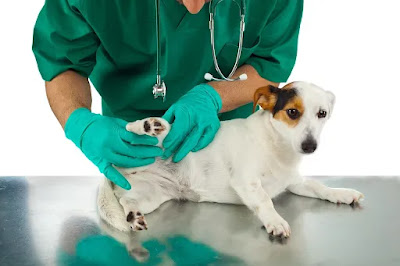Allergy in Dogs - Food Allergy
Dog allergies come in a variety of forms, with food allergies being the third most frequent, affecting roughly 10% of all domestic dogs. Contrary to popular opinion, it appears that foods that are not natural to dogs, such as cheese and tuna, as well as an excess of proteins in protein-rich meals, might cause dog food allergies.
However, this may not account for all food allergies in dogs, as many dogs might have a severe allergic reaction to meals created expressly for dogs. It appears that, like human allergies to nuts, fish, eggs, and other foods, a dog allergy, whether food-related or not, can be unpredictable in how individual dogs react to it. So, how do you know if you have allergies?
Food allergies cause dogs to respond in a variety of ways, the most common of which is scratching. Most canine allergies irritate the dog's skin, causing it to scratch, just like humans do when we have an itch. However, if a dog's allergy becomes severe, it may bite or gnaw at the troublesome part of its skin instead of scratching. As the immune system works to boost blood supply to the afflicted area and eventually react to any bacterial infection that may occur as a result of the dog breaking the skin, the physical effect might be hair loss and skin irritation.
In the case of a dog allergy, food will naturally pass through the digestive tract, and a true allergy may often result in loose stools or even diarrhea, as well as vomiting. Even if none of these more severe side effects occur, the dog's bowel motions will become more frequent, and sneezing, coughing, nasal discharge, appetite loss, and anal irritation may occur.
When your dog has a food allergy, it may sit down and pull its nether area along the carpet to relieve itching, and many dogs may also get serious ear infections. It's crucial to think about all of these symptoms collectively rather than separately because each one could signal a distinct health problem or even an allergy. When taken together, however, you should be able to diagnose a dog allergy that is caused by food rather than anything else.
Some of these symptoms are present in flea allergies and other topical allergies, but not all, and the same is true of atopic allergies like dog hay fever. Only a canine food allergy will reveal all of them, allowing you to determine how to assist your dog with his or her diet. Your dog eats what you give it, and your 'best friend' counts on you to give it food it enjoys and is safe to eat. You can surely aid your dog if you've been diagnosed with a food allergy.
To begin with, dogs rarely develop food allergies overnight, therefore this is most likely due to a change in his diet or something your dog has been consuming without your knowing. Consider any recent changes to your dog's diet, such as finding a better price on dog biscuits or switching to canned food, to determine the main cause of the problem.
Whatever the cause, identifying the change in your dog's food since the problem was first noticed would be extremely beneficial to both you and your dog. Animal proteins, such as turkey, chicken, pig, cheese, and other dairy products, that have been offered to it as a 'reward' - commonly at a family get-together event when you have guests who might 'feed the dog' with nibbles at the table - are often the cause of a dog allergy food problem.
It's best to keep any pets out of the house or in a different room during these times, as this type of protein-rich meal is a common cause of food allergies in pets. So, what can you do if you think your best friend has a canine allergy that is caused by food rather than another allergen?
You can either try to figure out which meal is causing the problem or return the dog to the food he was eating before you noticed the problem. Have you recently modified his diet? Has she been going missing for a long and then not seeming as hungry as usual? Keep an eye on her to see what she's up to. You might feed your dog his regular food and gradually eliminate one component at a time until you figure out what's causing the problem.
Any dog allergy, whether food-related or not, can be dangerous because your dog will scratch, bite, and gnaw at his or her skin until it becomes infected. So, figure out what's causing the problem and fix it.


